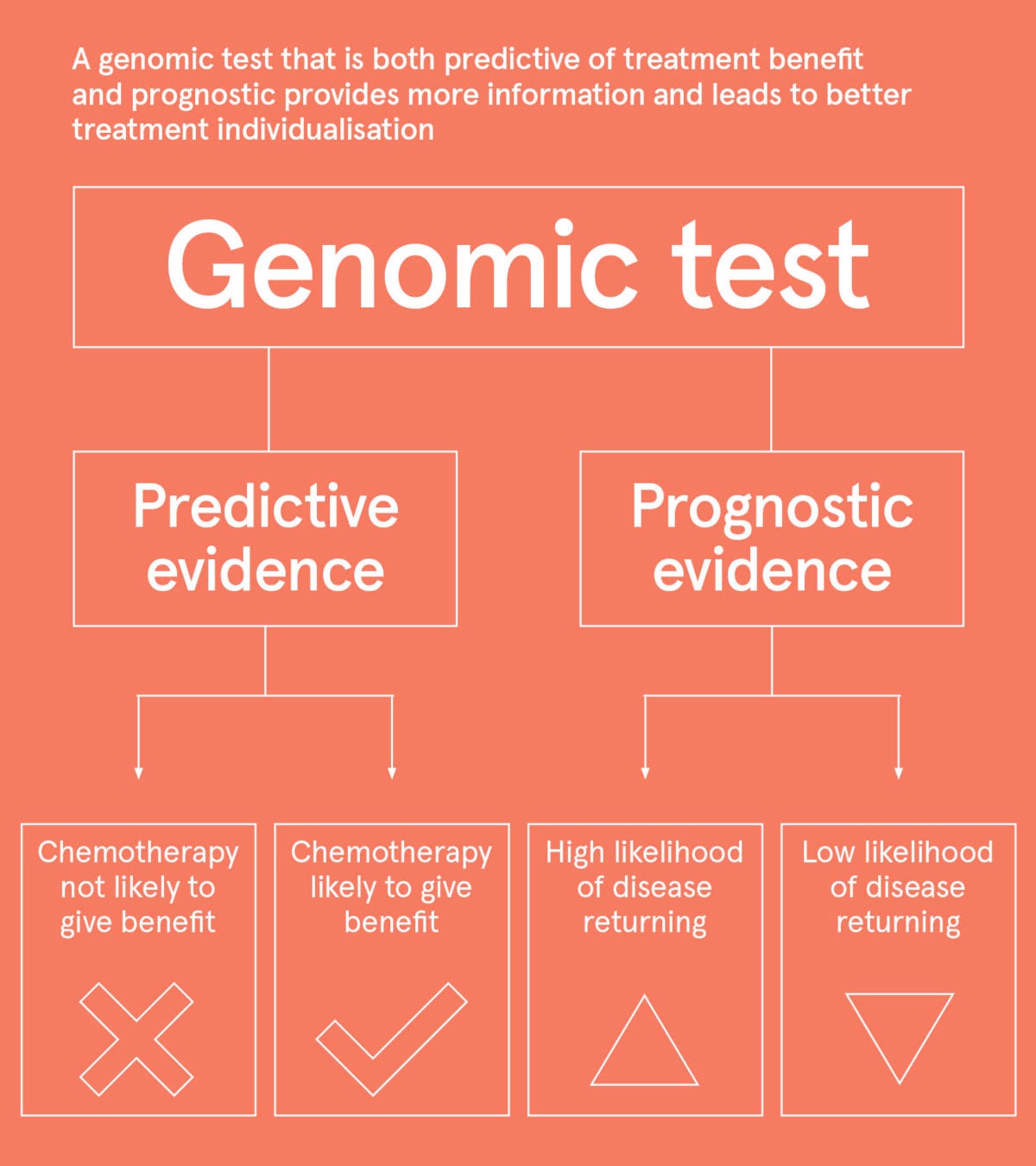When given a breast cancer diagnosis, the first question in many patients’ minds is: “Will I need chemotherapy?” The treatment can be debilitating, causing emotional strain and increasing economic costs for many patients. Chemotherapy is an important option for some patients, but for the majority, it provides little or no clinical benefit.
The Oncotype DX Breast Recurrence Score® test is available and can identify which patients will benefit from chemotherapy, potentially sparing thousands from unnecessary treatment.
Advances in the understanding of cancer mean clinicians can offer increasingly personalised treatment to patients. Genomics harnesses information about a patient’s tumour biology enabling treatments to be tailored to the individual patient.
The Oncotype DX test predicts how likely it is that breast cancer may come back after surgery and the likely benefits of having chemotherapy. It was developed by Genomic Health, the world’s leading provider of genomic-based diagnostic tests that address the overtreatment and optimal treatment of early-stage cancer, one of the greatest issues in healthcare today.
Oncotype DX® gives greater certainty about the benefit to patients of undergoing chemotherapy
In the UK, the test has been approved by the National Institute for Health and Care Excellence, the health and care regulator, and is available on the NHS. Cancer specialists say it is making a profound difference to patients and their families.
Marianne Dillon, consultant oncoplastic breast surgeon at Swansea Bay Health Board, who has been using the test for five years, says: “One of the first questions people ask after a breast cancer diagnosis is whether they will need chemotherapy. It is frightening for them and for their families.”
One patient told Miss Dillon she was so happy she would not need chemotherapy because of the impact it would have had on her family, rather than because she had been spared the treatment.
“Oncotype DX gives greater certainty about the benefit to patients of undergoing chemotherapy. It means we can minimise treatment and consider other options when chemotherapy is not needed,” says Miss Dillon.

“The test result is not determined by the grade or size of the tumour and we have had unexpected results in many cases, which have confounded the anticipated treatment plan and informed a change of course. This shows the real value of the test.”
The Oncotype DX test gives a score, known as the Recurrence Score® result, from 0 to 100. The higher the score, the more likely breast cancer is to come back and the more likely patients will benefit from having chemotherapy as well as hormone therapy.
Last year, the TAILORx trial, the largest randomised adjuvant breast cancer trial ever conducted, found that 73 per cent of patients with high clinical risk had recurrence scores of 0-25 and may have been overtreated without the Recurrence Score.
Some 43 per cent of patients with a Recurrence Score of 26-100 had low clinical risk and may have been undertreated without the Recurrence Score result. The trial involved more than 10,000 patients in six countries.
The Oncotype DX test analyses the individual biology of a breast cancer tumour by examining the activity of 21 genes in the tumour tissue. The test is performed on a small amount of the tissue removed during the original surgery, so the patient does not need to undergo any additional surgical procedures. The tissue is sent to a central laboratory and the results are sent back to the clinician within seven to ten days.
Studies suggest that the results change breast cancer treatment decisions in between 30 to 60 per cent of cases. The test is suitable for some people recently diagnosed with early-stage breast cancer who are oestrogen receptor positive and HER2 negative. It can be used in either cancers that have or have not spread to the lymph nodes under the arm.
Worldwide, more than 19,000 doctors have ordered the Oncotype DX assay in more than 90 countries and almost one million patients have received the information provided by the Oncotype DX test.
Marianne Dillon is a consultant oncoplastic breast surgeon at Swansea Bay Health Board
For more information please visit www.genomichealth.com/en-GB/ or www.oncotypeiq.com/en-GB
